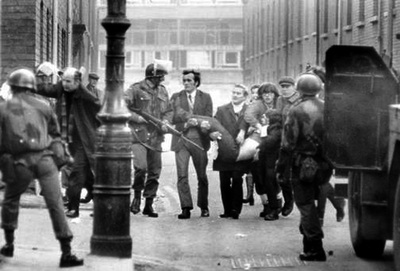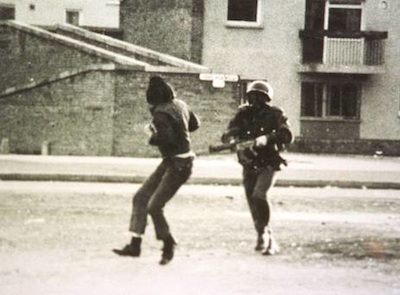
The Bloody Sunday families have called for the PSNI to begin interviewing soldiers who killed anti-internment protestors in 1972 amid indications that a criminal investigation into the massacre is finally getting underway.
The PSNI has said they intend to start questioning civilians in Derry who gave evidence to the Saville Inquiry, including those who were injured and those who watched their loved ones being gunned down by British paratroopers.
However, the killer soldiers have never been questioned as a part of a criminal investigation, and remain anonymous to this day.
The PSNI claimed this week it is now necessary to re-interview civilian witnesses because they are unable to use previous testimonies, for unspecified legal reasons.
The announcement was made on the anniversary of Bloody Sunday, and comes more than three and a half years after the Saville Tribunal issued a report in which it was admitted that the British Army killings of 14 civilians was “unjustified and unjustifiable”.
In July 2012, more than forty years after the massacre, the PSNI finally said it had plans to investigate the deaths. However, it has since emerged that an actual investigation team was only brought together in September 2013.
John Kelly, whose brother was shot dead on Bloody Sunday, said the PSNI investgation team should first focus efforts on interviewing the soldiers responsible for the atrocity, rather than the victims.
“In any murder inquiry, the first people to be interviewed are always the suspects. I am concerned that it has taken so long to get to this point,” Mr Kelly said.
“I think a lot of time has been wasted. We are completely in line with what the police are doing but they should either interview the soldiers in parallel with the civilians or they should interview the military first.”
Mr Kelly said the families were also unhappy with a decision to replace the 12 PSNI members assigned to the investigation with retired officers from England, Scotland and Wales.
“We would like the 12 PSNI officers and the 12 retired officers to be kept in place. It’s a fact that people are getting older and many witnesses have already passed away. By retaining all the officers, the investigation could be processed much quicker.”
MINUTE’S SILENCE
The Bloody Sunday families staged a minute’s silence at the scene of the killings at 4pm yesterday [Thursday], while on Sunday a march for justice for the victims will retrace the steps of the original march.
In a poignant ceremony, relatives of people killed by the British Crown forces in Derry, Belfast, Armagh and Tyrone recalled their loved one’s deaths.
The daughter of a Shankill Road Protestant shot dead by British soldiers in 1972 also took part in the ceremony as one of 14 speakers from across the north.
The Belfast woman’s father, Ritchie McKinney, was shot dead by a member of the Parachute regiment in September 1972, the same year as the Derry killings. She subsequently passed her father’s case onto human rights’ group The Pat Finucane Centre.
“It didn’t suit the unionist side to actually stick up for us; they were saying the army didn’t shoot anybody,” she said. “Today was brilliant because I have met families in the same position as myself. I just don’t feel so alone now.”

![[Irish Republican News]](https://republican-news.org/graphics/title_gifs/rn.gif)
![[Irish Republican News]](https://republican-news.org/graphics/title_gifs/harp.gif)

